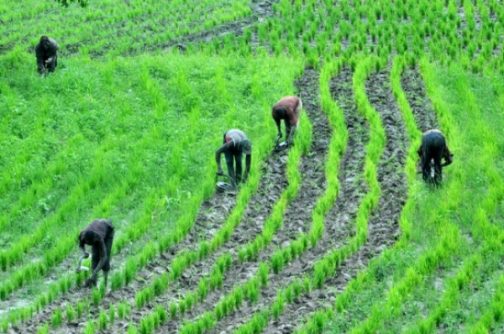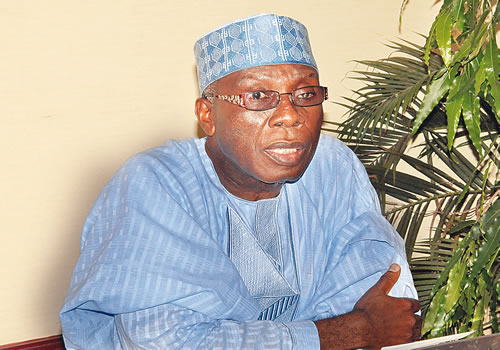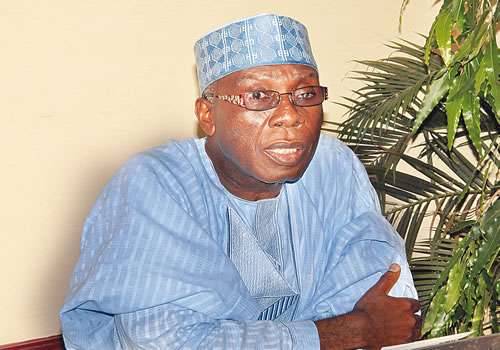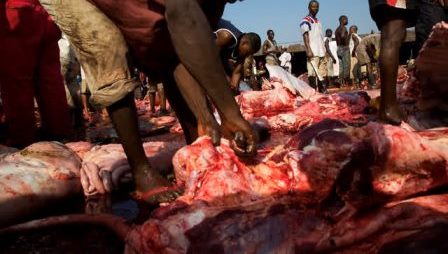Agribusiness
FG rice revolution: A true tale!
Published
10 years agoon
By
Olu Emmanuel
Five months ago the Minister of Agriculture and Rural Development, Chief Audu Ogbeh, innocently told Nigerians that the Federal Government would stabilise the price of rice from April to make it affordable to everybody in the country while declaring open the 2016 National wheat farmers field day in Alkamawa village in Bunkure Local Government, Kano state.
Yet in the same month of April Nigerians witness the commencement of hike in the price of rice and unaffordability of the produce in the market by many. Stakeholders in the rice value chain still believe the rice revolution is real and not a myth. Like the change been talked about in the economy, it is a gradual process and it is not another story. Some other agribusiness experts say the many unfulfilled promises of the Federal Government and the current general hardship been experienced will make Nigerians not to believe the Minister Rice Revolutionary plan.
The CBN Anchored Borrowers Initiative, a Federal Government back-up plan to see that farmers access loans to get their job done is been seen by economic experts as a stich in time to salvage the agricultural sector of the economy. How well is the initiative executed is another rounds of talk going on within the sector. Some stakeholders in the Southern Geo-Political Zones of the country are not satisfy the way the Federal Government is concentrating in the North and thus called for even distribution.
The CBN and the honorable Minister of Agriculture team with the various State governments are heaven determined to see that the FG Rice Revolution brings about a new dawn of Nigerians not only producing rice for themselves but also exporting to other African Nations who like Nigeria import rice heavily. As at today over eleven States are on serious pursuit of the production of rice in their various domains with the support of the FG and also form the ECOWAS. Agribusiness experts predicts that if all hands are on desk as seen in the move by the various states taking advantage of the FG CBN Initiatives, Nigerians should be ready to see a true revolution in the rice value chain.
Activities of rice farming in some States
Recently, the Adamawa State Commissioner for Agriculture, Mr Waziri Ahmad, disclosed that its Government has registered 120,000 rice and maize farmers as beneficiaries under the Anchored Borrowers initiative and more so some commercial banks would also provide funds to farmers which would be guaranteed by the Central Bank of Nigeria.
ALSO SEE: Nigeria to stop importation of rice, sugar, others by 2018
Ahmad who said that a total sum of N23 billion was expected to be injected into the programme, with Adamawa choosing to produce rice and maize, explained that under the scheme, a minimum of 150,000 hectares of farm land would be utilised by the farmers in producing rice and maize in 2016.
In Bayelsa, the Rice Farmers Association of Nigeria (RIFAN), the State Chapter Chairman Mr Ezekiel Ogbianko said it had registered 3,885 rural-based farmers’ cooperatives in the state in order to boost rice production as the famers were working hard to go into mechanized rice farming.
Ogbianko further disclosed that members of the cooperatives were rural-based farmers selected from the eight local government areas of the state and they are planning to organise a seminar for the farmers; the seminar will enable us to enlighten them on the necessary things on agribusiness and need for efficient food production.
Furthermore in the FG Rice Revolutionary move, the Kano State Government said it had supported rice and wheat farmers with N1.1 billion loan, as part of efforts to boost production of the two commodities in the state, the state’s Commissioner for Agriculture and Natural Resources, Dr Nasiru Gawuna, disclosed recently in Kano.
Gawuna who said that out of the total loan package, the state government had approved N1 billion for the rice farmers, while the remaining balance of N100 million was disbursed to wheat farmers, explained that the loan would enable farmers of the two crops to access quality seeds and other required farm inputs for enhanced productivity.
While in Lagos State, Mr Sanni Okanlawon, the Special Adviser to Gov. Akinwumi Ambode on Food Security, revealed that the State Government is putting finishing touches to the production of ‘Lake Rice,’ which would be available in the market in the next six months as the rice paddy would be milled at Imota, Ikorodu surburb.
Okanlawon further disclosed that the state government was collaborating with its Kebbi counterpart, to ensure that quality rice emanated from the 2.5 metric tonne-capacity mills to boost food production in Lagos State. Noting that Kebbi is the largest producer of rice paddy and the State has the capacity to mill them at our 2.5 metric tonne-capacity milling plant in Imota.
In the South East, the Ebonyi government has allocated 140 hectares of land to members of the State Executive Council (Exco) for compulsory cultivation of rice,Mr Uchenna Orji, the Commissioner for Agriculture and Natural Resources, announced recently when he led the exco members and top government officials to supervise rice cultivation demonstration exercise at Government Farms in Ezillo, Ishiellu LGA.
Orji said 140 hectares of land have been allocated to the exco members for rice cultivation under the Multipurpose Cooperative Societies’ requirements of IFAD and Central Bank of Nigeria (CBN) and the remaining 1, 360 hectares are reserved for other cooperative societies and individuals that have already keyed-in into the policy through the IFAD and CBN Anchor Borrowers Programme.
In the same vein in the South-South, Mr Godwin Akwaji, Coordinator of the CBN Anchor Borrower’s Programme and Senior Assistant to the Governor on Revenue in Cross River State disclosed that the Government has begun training of rice farmers that would benefit from the Central Bank of Nigeria (CBN) Anchor Borrower’s Programme on Rice Value Chain in the state in Calabar as the programme was designed to boost rice production.
The Team of Leader of Southern Senatorial zone, Dr Martina Ubi, during the meeting with the State Rice Farmers also lauded the determination of rice farmers to identify with the programme despite the economic challenges in the state and noted that the large turnout of farmers was an indication that the programme would succeed in the state.
North – East Stakeholders Speaks
The rice train also sees stakeholders in some of the North Eastern states urging the government at all levels to give adequate support to farmers to enable them boost their production as rice and wheat farmers in the country have the potential to feed the country and export same if given the necessary support.
Malam Aminu Maiwada, a rice farmer in Gashua town of Yobe said that most states in the country had areas that were suitable for rice production and that in Yobe state, the Gashua/ Nguru wetlands, Nyakire lowlands, Ngalda plains and Godowoli valley had huge potential for irrigation rice farming that could produce rice to meet the needs of five other states
In another move ,Dr Yahaya Adamu, Chairman, Bauchi State Chapter of Rice Farmers Association of Nigeria (RIFAN), commended the Federal Government’s dry season inputs support programme, saying about 11,000 dry season rice farmers were registered in the state and noted that with the GES scheme, the Federal Government’s Agricultural Transformation Agenda (ATA) had solved farmers’ problem of accessing quality and affordable farm inputs, a situation that had hampered farmers’ productivity in the past.
Dr Matthew Ekaette, the state’s Commissioner for Agriculture, of Akwa Ibom Government also disclosed that it has secured N10 billion loan from Central Bank of Nigeria (CBN) for rice farmers to improve on their production in the state as 43, 000 registered rice farmers would benefit from the loan scheme.
ALSO SEE: Labana Rice collaborates with local farmers for rice paddy production
Ekaette explained that CBN was targeting N210, 000 per hectare of land, which covers the cost of farm inputs, seedlings, labour and land clearing and said that the money would be paid to the agricultural account of the farmers in the state.
The Bank of Agriculture (BOA) inputs
The Bank of Agriculture (BOA), Managing Director Prof Danbala Danju,in its bid to also reach and empwer Nigerian rice farmers disclosed that it is targeting 300,000 farmers in 13 states to achieve sufficiency in rice within 18 months. He said that the farmers were being identified in 13 rice producing states to key into the Central Bank of Nigeria (CBN) Anchor Borrowers’ Programme.
Danju further said that for now, the focus is on rice to help achieve the current objective of self-sufficiency in domestic rice production in about one and half years which President Muhammadu Buhari promised the country as the country has been importing rice and because of the foreign exchange and the focus of the new administration, the CBN came up with an anchor borrowers’ programme. He said the development followed the successful pilot programme in Kebbi where the Federal Government had so far disbursed N12 billion to support more than 75,000 rice farmers as more than 300,000 metric tonnes of rice is being produced from the pilot programme where 98,000 hectares of land is cultivated.
The BOA boss disclosed that the Federal Government directed that they work closely with the CBN to target about 13 states in the anchor rice programme as well as in wheat production, tomato and other staple crops and noted that the BOA is the best place to be as the specialist agricultural development bank which is more than 42 years in existence and has more than 137 branches all over the 36 states of the federation.
You may like


Rice Farmers commend Nigerian Govt for plans to shut borders


We either ranch or banish cattles from Nigeria – Audi Ogbeh


Nigeria’s paddy rice production jumps from 5mmt to 17mmt in 2 years plus — Ogbeh


Buhari hopes these colonies will reduce herdsmen-farmer clashes


Nigeria to face acute shortage of beef, dairy products, says Minister


Afe Babalola varsity to hold rice summit
Trending

 Health5 days ago
Health5 days agoDeclassified CIA memo explored concealing mind-control drugs in vaccines

 Entertainment7 days ago
Entertainment7 days agoSimi addresses resurfaced 2012 tweets amid online backlash

 Crime6 days ago
Crime6 days agoSenior police officers faces retirement after Disu’s appointment as acting IGP

 Education1 week ago
Education1 week agoPeter Obi urges JAMB to address registration challenges ahead of exams

 Health1 week ago
Health1 week agoNAFDAC issues alert on suspected revalidated SMA Gold infant formula

 Comments and Issues6 days ago
Comments and Issues6 days ago20 Critical Fixes to Save Nigeria’s Democracy from Electoral Fraud

 Football7 days ago
Football7 days agoMartínez ruled out of Everton clash with calf injury

 Latest6 days ago
Latest6 days agoICPC yet to respond to El-Rufai’s bail request as arraignment date looms

